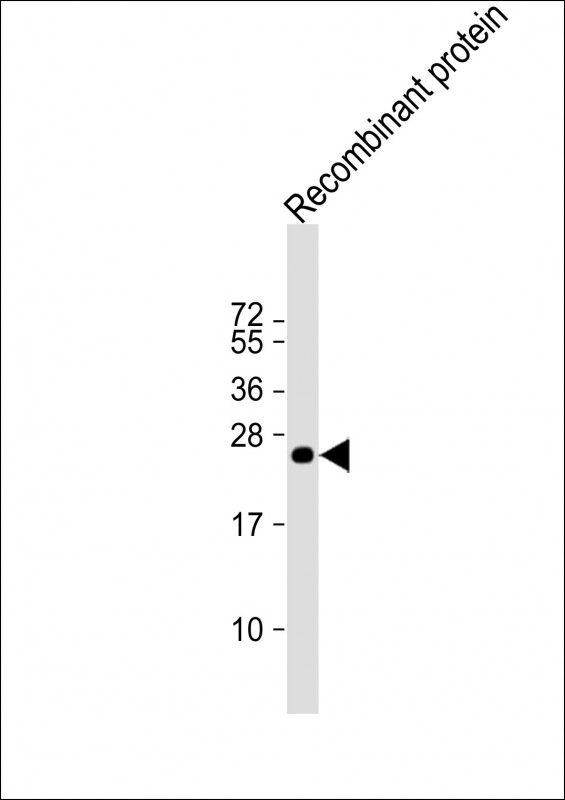
| WB | 1/2000 | Human,Mouse,Rat |
| IF | 咨询技术 | Human,Mouse,Rat |
| IHC | 咨询技术 | Human,Mouse,Rat |
| ICC | 技术咨询 | Human,Mouse,Rat |
| FCM | 咨询技术 | Human,Mouse,Rat |
| Elisa | 咨询技术 | Human,Mouse,Rat |
| Aliases | Histone-lysine N-methyltransferase 2C, Lysine N-methyltransferase 2C, 2.1.1.43, Homologous to ALR protein, Myeloid/lymphoid or mixed-lineage leukemia protein 3, KMT2C, HALR, KIAA1506, MLL3 |
| Entrez GeneID | 58508 |
| WB Predicted band size | 541.4kDa |
| Host/Isotype | Mouse IgG1 |
| Antibody Type | Primary antibody |
| Storage | Store at 4°C short term. Aliquot and store at -20°C long term. Avoid freeze/thaw cycles. |
| Species Reactivity | Human, Mouse |
| Immunogen | This MLL3 antibody is generated from a mouse immunized with a recombinant protein of human MLL3. |
| Formulation | Purified antibody in TBS with 0.05% sodium azide. |
+ +
以下是3-4条关于MLL3抗体的参考文献及其简要摘要内容:
1. **文献名称**:*MLL3 is a haploinsufficient 7q tumor suppressor in acute myeloid leukemia*
**作者**:Chen C et al.
**摘要**:该研究利用MLL3抗体进行染色质免疫沉淀(ChIP-seq)和免疫印迹分析,发现MLL3在急性髓系白血病(AML)中作为7q染色体上的肿瘤抑制因子,其缺失导致关键基因调控异常。
2. **文献名称**:*MLL3 binds UTX through its PHD domain to mediate tumor suppression*
**作者**:Lee J et al.
**摘要**:通过免疫共沉淀(Co-IP)和蛋白质相互作用实验(使用MLL3抗体),研究发现MLL3通过其PHD结构域与UTX蛋白结合,协同调控组蛋白修饰(H3K4甲基化),从而抑制肿瘤发生。
3. **文献名称**:*Recurrent mutations in the MLL3/KMT2C gene in gastric cancer*
**作者**:Wang K et al.
**摘要**:该研究通过免疫组织化学(IHC)和Western blot(使用MLL3抗体)检测胃癌组织中MLL3蛋白表达,发现MLL3基因高频突变导致其功能丧失,与患者预后不良相关。
4. **文献名称**:*The COMPASS family protein MLL3 regulates adipogenesis*
**作者**:Kim DH et al.
**摘要**:研究利用MLL3抗体进行ChIP-seq和基因敲除实验,揭示MLL3通过调控PPARγ等关键转录因子的染色质可及性,在脂肪细胞分化中起重要作用。
以上文献均涉及MLL3抗体的实验应用(如蛋白质检测、互作研究或表观遗传调控分析),并探讨其在癌症或发育中的功能机制。
The MLL3 (Mixed Lineage Leukemia 3) antibody is a crucial tool for studying the MLL3 protein, a member of the lysine-specific methyltransferase family (KMT2C). MLL3 is part of the COMPASS-like complex, which catalyzes histone H3 lysine 4 (H3K4) methylation, a key epigenetic modification associated with active gene transcription. It plays roles in regulating chromatin structure, cellular differentiation, and embryonic development. Dysregulation of MLL3 is linked to cancers, including leukemia, breast cancer, and pancreatic cancer, often due to mutations or deletions in the KMT2C gene.
The MLL3 antibody is widely used in research to detect protein expression, localization, and interaction partners via techniques like Western blotting, immunohistochemistry, and chromatin immunoprecipitation (ChIP). Its specificity varies depending on epitope targets (e.g., N-terminal or C-terminal regions) and validation methods (knockout/knockdown controls). Commercial antibodies are available from multiple suppliers, requiring careful validation for experimental reliability. Studies using MLL3 antibodies have advanced understanding of its tumor-suppressive functions, roles in metabolic regulation, and involvement in diseases like Kabuki syndrome. Ongoing research focuses on its therapeutic potential and mechanisms in epigenetic reprogramming.
×